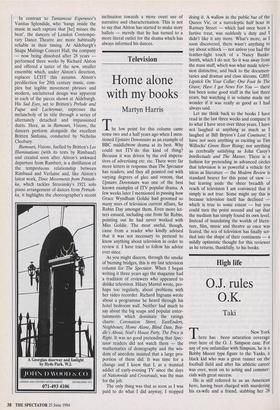Television
Home alone with my books
Martyn Harris
The low point for this column came some two and a half years ago when I men- tioned Upstairs Downstairs as an example of BBC middlebrow drama at its best. Why could not ITV do this kind of thing? Because it was driven by the evil impera- tives of advertising etc. etc. There were far more letters in response than The Spectator has readers, and they all pointed out with varying degrees of glee and venom, that Upstairs Downstairs was one of the best known examples of ITV popular drama. A few weeks later I mentioned in passing how Grace Wyndham Goldie had groomed so many stars of television current affairs, Sir Robin Day amongst them. Even more let- ters ensued, including one from Sir Robin, pointing out he had never worked with Miss Goldie, The most useful, though, came from a reader who kindly advised that it was not necessary to pretend to know anything about television in order to review it. I have tried to follow his advice ever since.
As you might discern, through the smoke of burning bridges, this is my last television column for The Spectator. When I began writing it three years ago the magazine had a tradition of reviewers who appeared to dislike television. Hilary Mantel wrote, per- haps too regularly, about problems with her video recorder. Richard Ingrams wrote about a programme he heard through his hotel bedroom wall. Neither had much to say about the big soaps and popular enter- tainments which dominate the ratings charts: Coronation Street, EastEnders, Neighbours, Home Alone, Blind Date, Bea- dle's About, Noel's House Party, The Price is Right. It was no good pretending that Spec- tator readers did not watch them — the mathematics of demography and the wis- dom of anecdote insisted that a large pro- portion of them did. It was time for a change and I knew that I, as a stunned addict of early-evening TV since the days of Nationwide and Crossroads, was the man for the job.
The only thing was that as soon as I was paid to do what I did anyway, I stopped
doing it. A wallow in the public bar of the Queen Vic, or a narcoleptic half hour in Ramsey Street — which had once been a furtive treat, was suddenly a duty and I didn't like it any more. What's more, as I soon discovered, there wasn't anything to say about schlock — not unless you had the feather-light touch of a Nancy Banks- Smith, which I do not. So it was away from the mass stuff, which was what made televi- sion distinctive, and back to the documen- taries and dramas and class sitcoms. GBH; Lipstick On Your Collar; One Foot In The Grave; Have I got News For You — there has been some good stuff in the last three years, but watching it in volume made me wonder if it was really as good as I had always said.
Let me think back to the books I have read in the last three weeks and compare it to what I have seen over three years. I have not laughed at anything as much as I laughed at Bill Bryson's Lost Continent; I have not seen anything as exciting as Tim Willocks' Green River Rising; nor anything as cerebrally satisfying as John Carey's Intellectuals and The Masses. There is a fashion for pretending in advanced circles that television is as powerful a vehicle for ideas as literature — the Modem Review is standard bearer for this point of view but leaving aside the sheer breadth of reach of television I am convinced that it simply is not true. Some might say this is because television itself has declined which is true to some extent — but you could turn the point around and say that the medium has simply found its own level. Instead of inundating the worlds of litera- ture, film, music and theatre as once was feared, the sea of television has finally set- tled into the shape of their continents — a mildly optimistic thought for this reviewer as he returns, thankfully, to his books.
































































 Previous page
Previous page